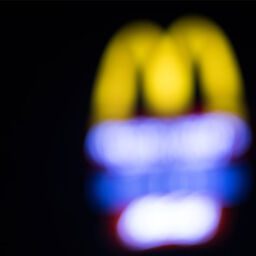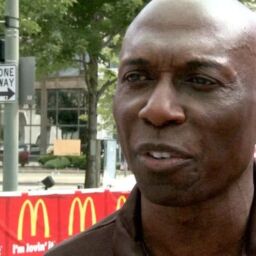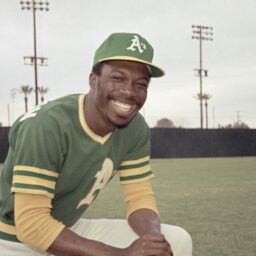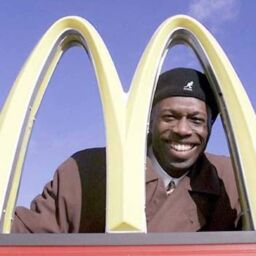Activists are urging a McDonald’s boycott over alleged longterm discrimination. “We want the knee off of our neck.”
On Monday, McDonald’s franchisees and community organizers kicked off a 90-day protest at the chain’s global headquarters in the West Loop neighborhood of Chicago to confront what they say are predatory practices against Black-owned franchises.
“We don’t spend our money on disrespect,” said community activist Mark Carter, who is urging people worldwide to boycott the chain.
Wallace “Gator” Bradley, the activist who organized the first protest, said it was important to educate the public about discriminatory actions of large corporations, especially during Black History Month.
The protests are in response to a string of similar lawsuits. Brothers James Byrd Jr. and Darrell Byrd filed a class action complaint against McDonald’s in October 2020 “seeking racial justice and economic equality by holding McDonald’s accountable for its company-wide and decades-long violations of federal and state laws in denying Black franchisees equal rights under their franchise agreements.”
The Byrds, who attended the Chicago protest Monday, each own two McDonald’s restaurants in the Nashville Region. James Byrd has been a franchisee for 31 years, at one point owning 10 restaurants, and Darrell Byrd has been a franchisee for 22 years, at one point owning four stores. James Byrd is the only remaining Black McDonald’s franchisee in Memphis, Tenn.
“As a Black operator, it’s almost like you’re shuttered behind prison bars,” said Darrell Byrd. “We want to realize the dream of McDonald’s. My goal is to make sure Black operators in the system are treated equally.”
The brothers allege there is a $900,000 annual cash flow gap between Black franchisees and white operators.
“McDonald’s growth strategy has been predatory in nature, targeting Black consumers, markets, and territories by steering Black franchisees to Black neighborhoods with high overhead costs—including higher security, insurance, and employee turnover—where White franchisees refused to own and operate restaurants,” reads the lawsuit.
Another lawsuit former Major League Baseball player Herbert Washington filed earlier this month claims the company’s practices caused a $700,000 sales gap between Black-owned franchises and those owned by white franchisees. A third class action lawsuit filed by Ferraro Law Firm, the same lawyer representing the Byrds, represents 77 franchisees who allege McDonald’s “sold itself as a recruiter and developer of Black talent, profited from its Black consumer base and maintained a two-tier system that pigeonholed unsuspecting Black owners and assigned them horrible locations guaranteed to fail.”
The cash flow gap between McDonald’s Black and white franchisees has more than tripled from 2010 to 2019, per data from the National Black McDonald’s Operators Association. In 1998, McDonald’s had 400 Black franchisees and today there are fewer than 200, but since 1998 the number of franchised McDonald’s restaurants has more than doubled.
“Over several years, the total number of franchisee organizations in the U.S. has decreased as the number of restaurants each franchisee organization owned has increased on average,” a statement from McDonald’s explains. “During this time period, the overall representation of Black franchisees remains broadly unchanged.”
However, the Byrds and others in the class action suit argue that the current McDonald’s business model pushes Black franchisees further into debt, allowing McDonald’s to deem Black franchisees ineligible for growth or renewal, while offering white franchisees newer, safer, and more profitable locations. They say the only way to break the cycle is to force McDonald’s to treat Black and white franchisees the same.
“McDonald’s takes it commitment to diversity, equity and inclusion seriously and does not tolerate discrimination of any kind. We are working towards our recent DEI goals and continue to drive equitable opportunity under the Arches. We must go further and remain focused on serious action to accelerate meaningful and overdue societal change,” said Reggie Miller, McDonald’s Global Chief Diversity, Equity and Inclusion Officer in response to the protests.
The lawsuits and protesters are asking McDonald’s to provide Black franchisees open and equal access to the geographic market of locations that meet or exceed McDonald’s disclosed national average sales; to ensure that Black franchisees are offered growth opportunities to the same extent that such growth opportunities are available to other franchisees in the same geographic area; to ensure its grading and inspection standards are fairly and uniformly applied; and to invest $500 million into a “minority investment fund” that will invest in new franchises.
“If not now, when?” says James Byrd. “We are absolutely not pleased that we’re still talking in 2021 about trying to gain equality, respect, and dignity. And we want the knee off of our neck. Not only now, but for future generations. McDonald’s should be a beacon of shining arches, not just arches.”
McDonald’s established its franchise system in 1955, but Black franchisees were denied entry until 1968, following a year of civil unrest. During Black Lives Matter protests this summer reminiscent of the 1960s, McDonald’s Chief Executive Officer Chris Kempczinski appeared on CNBC’s “Mad Money with Jim Cramer” and said that, “McDonald’s has created more millionaires within the Black community than probably any other corporation on the planet.”
James Byrd called that “one of the most arrogant statements I’ve ever heard of all time,” and pointed out that Kempczinski never talked about how many white millionaires the company has made. Around the same time, John Rogers, founder of Ariel Investments and on the McDonald’s Board of Directors, wrote an op-ed in Fortune saying there is “no finer example of an equitable business model in America than the one McDonald’s has.”
The Byrds say they found that upsetting.
“They got the only Black board member to make those comments and try to disparage operators,” said James Byrd. “It’s more than hurtful.”
In November 2020, McDonald’s hired Reggie Miller to the newly created Global Chief Diversity, Equity and Inclusion Officer role and on February 18, 2021 pledged to increase representation of historically underrepresented groups in senior director and above leadership roles in the U.S. from 29 percent to 35 percent by the end of 2025.
Bradley suggests it’s telling that Miller wasn’t hired until after the lawsuit was filed, but that McDonald’s still has a chance to do right by Black franchisees.
“All the CEO needs to do is meet with the Byrds and their lawyer and iron this out,” he says.
The brothers had a meeting with McDonald’s scheduled for Feb. 23, but it was cancelled that morning and has not been rescheduled. (Food & Wine has reached out to McDonald’s for comment as to why the meeting was cancelled.)
The 90-day protests are taking place through Clubhouse and Facebook (using the hashtag #RayIsaCrock, in reference to the chain’s founder), and will resume in-person at the McDonald’s Chicago headquarters on Monday, March 1 at 11 a.m. The Byrds and activists will also hold a press conference at the Memphis Civil Rights Museum on March 2. Carter says the protests will last 90 days or longer, until their demands are met.
Food & Wine | Rebecca Holland | February 26, 2021
Civil Rights Lawsuits | FREE Consultation
Peiffer Wolf Carr Kane & Conway is a nationally recognized law firm. Our team of attorneys is fully prepared to assist our clients, protect their privacy, and guide them through the process in Civil Rights cases. If you or a loved one has been the victim of discrimination based on race, gender, sexual orientation, national origin, and/or religion, Contact Us immediately. You can fill out an online contact form or call 216-589-9280 for a FREE Consultation. Remember: everything you share with your lawyer is confidential.









